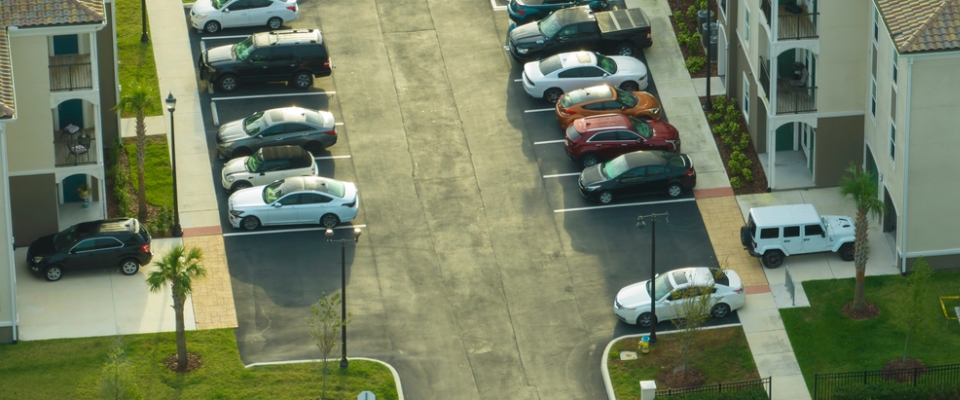Share this article:
If you and your roommate are searching for a new rental place and you both have cars, there’s a good chance you’ll run into a common urban parking issue: tandem parking. This setup — where one car parks directly behind the other — is especially common in apartment communities and townhomes, particularly in busy cities like San Francisco, New York City, Chicago and other major hubs where space is limited.
At first, it might feel like more trouble than it’s worth, especially if your daily routines don’t line up. The idea of having to swap cars around just to leave the house can sound like a real hassle. But here’s the thing: Tandem parking is a pretty normal part of city living, and once you get used to it, it’s really not that bad.
With a little bit of planning, some shared ground rules, and clear communication between everyone involved, it becomes much easier to handle than you might expect. In fact, lots of people make it work with minimal stress — it just takes a bit of coordination and mutual consideration.
So, what is tandem parking?
Tandem parking means you’re assigned two parking spaces, but they’re arranged one behind the other — essentially forming a single, extra-long spot. While you technically have room for two cars, it’s not the same as having two separate, side-by-side spaces. In practice, the first car to park ends up being blocked in once the second car pulls in behind it.
So, if you were the one who parked first and later need to go somewhere, the person behind you will have to move their car to let you out. It’s a setup that requires a bit of coordination and communication, especially if both cars are used frequently.
Why do some places have tandem parking?
The reason behind tandem parking is pretty straightforward: it saves space. By fitting two cars into a single, elongated spot, developers can maximize the number of available parking spaces. In the case of townhouses, it also allows for narrower building footprints. This design choice plays a key role in reducing construction costs—thinner buildings are more economical to build, which can translate into lower purchase or rental prices once the units hit the market.

However, not everyone agrees that the savings benefit the buyer or renter all that much. Critics argue that any cost reduction is often minimal on the resident’s end, especially when weighed against the everyday inconvenience of managing a tandem setup.
The logistics can be tricky — residents often end up coordinating car movements or, in some cases, choosing to park on the street to avoid the hassle altogether. And if you live in a popular area where visitors frequently stop by, you might even find an unfamiliar vehicle blocking yours, adding yet another layer of frustration.
How to manage a tandem parking space
Renting a place with tandem parking might feel like a bit of a hassle at first, but don’t let that stop you from choosing your happy place! A little planning can go a long way in making it work smoothly. Here are three essential tips to help you and your roommate navigate and manage a tandem parking setup with ease:
Now let’s break down each tip and how it can make tandem parking a practical choice when renting with roommates:
Know each other’s schedules
If you’re going to share a tandem parking spot, being in sync with your roommate’s schedule is key. Ideally, if you both have consistent, similar work hours and minimal outside commitments, organizing who parks where becomes pretty straightforward. But if your schedules are more unpredictable or don’t align well, it’s a good idea to set up a shared calendar and agree on a few basic parking rules for each day of the week.
Let’s say you usually get home around 5 p.m. on Tuesdays, your roommate arrives at 6, and you have a chess class at 8 — your roommate should know about that ahead of time so they can move their car when needed. Likewise, if you tend to get home earlier and leave earlier in the morning, it’s smart to shift your car as soon as your roommate returns in the evening. That way, you won’t be stuck trying to rearrange cars before heading out the next day.
Communicate changes effectively
Even with the best planning and constant communication, life happens — spontaneous plans, last-minute errands, or unexpected emergencies are inevitable. That’s why it’s important to stay flexible and keep each other updated as soon as something changes. If your schedule shifts or a new appointment pops up, let your roommate know right away so you can adjust the tandem parking arrangement accordingly.

A simple and effective way to stay on the same page is to create a dedicated chat thread just for parking updates. That way, anytime either of you needs to coordinate or share a change, it’s easy to find and quick to respond to. Keeping the conversation centralized ensures no one misses a message, and it helps avoid confusion when plans shift unexpectedly.
Prepare for the unexpected
Finally, it’s smart to have a backup plan in place for those rare (but inevitable) moments when things don’t go as expected. Imagine you need to get your car out, but your roommate is parked behind you and nowhere to be found. What then? If you’re living with a significant other, one simple solution is to share vehicles — whichever car is available, you take. This approach can eliminate many of the headaches that tandem parking tends to create.
However, if car sharing isn’t an option — or just not something you’re comfortable with — make sure there’s a practical workaround. The easiest fix? Keep a spare set of keys for each vehicle in a secure but easily accessible spot at home. That way, if plans change suddenly or someone’s running late, you won’t be left stranded or forced to call your roommate in a panic. It’s a small step that can prevent a lot of stress.

At the end of the day, tandem parking may not be the most convenient arrangement, but with some planning, communication, and flexibility, it’s totally manageable. When deciding whether a townhome or apartment with tandem parking is right for you, consider not just the logistics but also your relationship with your roommate or partner. If you trust and communicate well with each other, chances are you’ll handle the challenges just fine.
Still searching for a place that checks all your boxes — including the right parking setup? Explore thousands of apartment listings near you and find a home that fits your lifestyle.
Share this article:
Veronica Grecu is a senior creative writer and research analyst for RentCafe. With more than 14 years of experience in the real estate industry, she covers a variety of topics in the apartment market, including rental competitiveness, new construction and other industry trends. Her work has been featured in top publications like The New York Times, The Washington Post, The Wall Street Journal, The Philadelphia Inquirer, The Miami Herald, CNN, CNBC, and more. Prior to RentCafe, Veronica was involved in producing real estate content for Multi-Housing News, Commercial Property Executive and Yardi Matrix. She holds a B.A. in Applied Modern Languages and an M.A. in Advertising and PR.
The Ready Renter has your back
Tips, news, and research curated for renters, straight to your inbox.




Related posts
Subscribe to
The Ready Renter newsletter







